大学生跨性别交际困扰度的性别角色差异研究_英文_
- 格式:pdf
- 大小:218.49 KB
- 文档页数:3
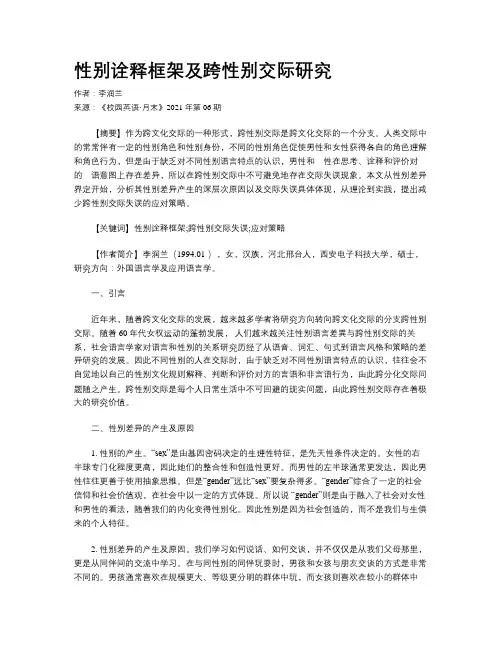
性别诠释框架及跨性别交际研究作者:李润兰来源:《校园英语·月末》2021年第06期【摘要】作为跨文化交际的一种形式,跨性别交际是跨文化交际的一个分支。
人类交际中的常常伴有一定的性别角色和性别身份,不同的性别角色促使男性和女性获得各自的角色理解和角色行为,但是由于缺乏对不同性别语言特点的认识,男性和⼥性在思考、诠释和评价对⼥的⼥语意图上存在差异,所以在跨性别交际中不可避免地存在交际失误现象。
本文从性别差异界定开始,分析其性别差异产生的深层次原因以及交际失误具体体现,从理论到实践,提出减少跨性别交际失误的应对策略。
【关键词】性别诠释框架;跨性别交际失误;应对策略【作者简介】李润兰(1994.01-),女,汉族,河北邢台人,西安电子科技大学,硕士,研究方向:外国语言学及应用语言学。
一、引言近年来,随着跨文化交际的发展,越来越多学者将研究方向转向跨文化交际的分支跨性别交际。
随着60年代女权运动的蓬勃发展,人们越来越关注性别语言差異与跨性别交际的关系,社会语言学家对语言和性别的关系研究历经了从语音、词汇、句式到语言风格和策略的差异研究的发展。
因此不同性别的人在交际时,由于缺乏对不同性别语言特点的认识,往往会不自觉地以自己的性别文化规则解释、判断和评价对方的言语和非言语行为,由此跨分化交际问题随之产生。
跨性别交际是每个人日常生活中不可回避的现实问题,由此跨性别交际存在着极大的研究价值。
二、性别差异的产生及原因1. 性别的产生。
“sex”是由基因密码决定的生理性特征,是先天性条件决定的。
女性的右半球专门化程度更高,因此她们的整合性和创造性更好。
而男性的左半球通常更发达,因此男性往往更善于使用抽象思维。
但是“gender”远比“sex”要复杂得多。
“gender”综合了一定的社会信仰和社会价值观,在社会中以一定的方式体现。
所以说“gender”则是由于融入了社会对女性和男性的看法,随着我们的内化变得性别化。
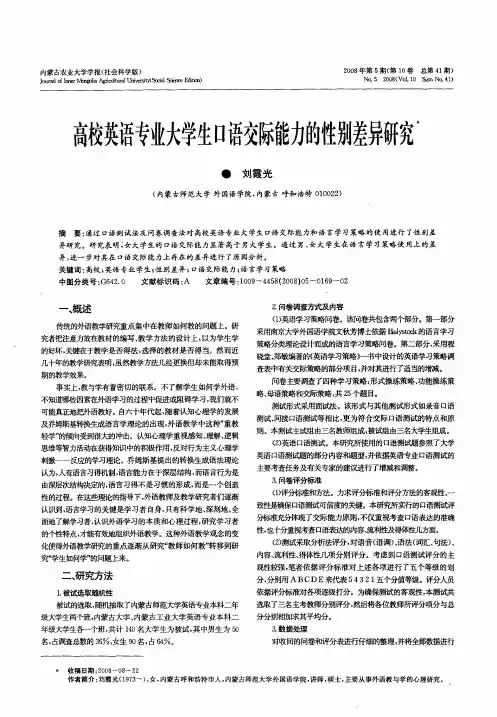
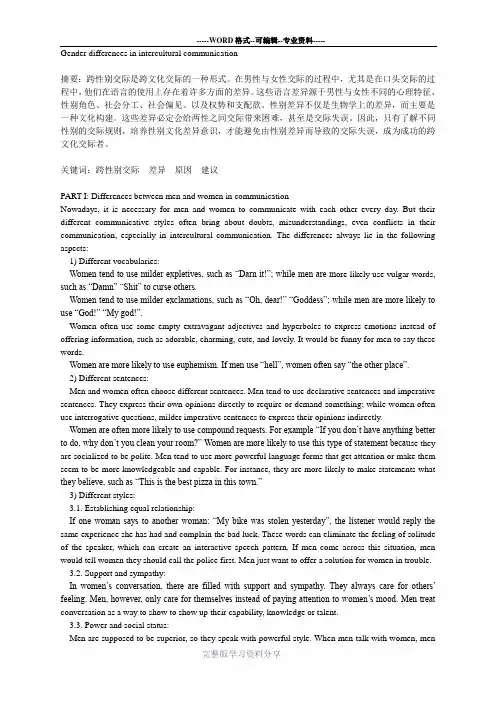
Gender differences in intercultural communication摘要:跨性别交际是跨文化交际的一种形式。
在男性与女性交际的过程中,尤其是在口头交际的过程中,他们在语言的使用上存在着许多方面的差异。
这些语言差异源于男性与女性不同的心理特征、性别角色、社会分工、社会偏见、以及权势和支配欲。
性别差异不仅是生物学上的差异,而主要是一种文化构建。
这些差异必定会给两性之间交际带来困难,甚至是交际失误。
因此,只有了解不同性别的交际规则,培养性别文化差异意识,才能避免由性别差异而导致的交际失误,成为成功的跨文化交际者。
关键词:跨性别交际差异原因建议PART I: Differences between men and women in communicationNowadays, it is necessary for men and women to communicate with each other every day. But their different communicative styles often bring about doubts, misunderstandings, even conflicts in their communication, especially in intercultural communication. The differences always lie in the following aspects:1) Different vocabularies:Women tend to use milder expletives, such as “Darn it!”; while men are m ore likely use vulgar words, such as “Damn” “Shit” to curse others.Women tend to use milder exclamations, such as “Oh, dear!” “Goddess”; while men are more likely to use “God!” “My god!”.Women often use some empty extravagant adjectives and hyperboles to express emotions instead of offering information, such as adorable, charming, cute, and lovely. It would be funny for men to say these words.Women are more likely to use euphemism. If men use “hell”, women often say “the other place”.2) Different sentences:Men and women often choose different sentences. Men tend to use declarative sentences and imperative sentences. They express their own opinions directly to require or demand something; while women often use interrogative questions, milder imperative sentences to express their opinions indirectly.Women are often more likely to use compound requests. For example “If you don’t have anything better to do, why don’t you clean your room?” Women are more likely to use this type of statement becau se they are socialized to be polite. Men tend to use more powerful language forms that get attention or make them seem to be more knowledgeable and capable. For instance, they are more likely to make statements what they believe, such as “This is the best pizza in this town.”3) Different styles:3.1. Establishing equal relationship:If one woman says to another woman: “My bike was stolen yesterday”, the listener would reply the same experience she has had and complain the bad luck. These words can eliminate the feeling of solitude of the speaker, which can create an interactive speech pattern. If men come across this situation, men would tell women they should call the police first. Men just want to offer a solution for women in trouble.3.2. Support and sympathy:In women’s conversation, there are filled with support and sympathy. They always care for others’ feeling. Men, however, only care for themselves instead of paying attention to women’s mood. Men treat conversation as a way to show to show up their capability, knowledge or talent.3.3. Power and social status:Men are supposed to be superior, so they speak with powerful style. When men talk with women, menoften control the turn of the topics and the sequence of the speakers. Men often interrupt the conversation or get the speech floor; men pay no attention to women by reacting with their minimal responses such as “mhm”.Compared with men, women are inferior and controlled by men. They speak with powerless style. When they talk with men, women are passive and modest by using interrogative sentences, tag sentences and so on. Women often treat these as a way to develop the conversation or draw attention of men.3.4. Continuation of conversation:By raising questions, women hope that others can continue the conversation. Whenever they finish a topic, they can turn to another smoothly. The principle of cooperation is well represented by women.Men often show they are busy by speaking a few words and then leaving hurriedly.3.5. Tone:W omen are more frequent to use super high and low tone. The tone can fully express the speakers’ emotion and is one of the characteristics of women. Women would like to answer questions with rising tone to show their uncertainty. Women are more frequent to use falling-raising tone and raising-falling-raising tone. The falling-raising tone shows hesitate-apologetic meaning and the raising-falling-raising tone an enthusiastic situation.4) Different strategies:4.1. Direct and indirect:Men tend to be direct w hen they express themselves, while women are often indirect. However, it isn’t always like this. In some cases, it is the women who are expecting direct statements and the men who are expressing themselves indirectly. The issue is not directness or indirectness; the issue is the current interpretive framework.4.2. Fit to specific environment:According to observation, in different conversation environment, women and men tend to speak differently. For example, in a business meeting, the most of the talk would be dominated by men. However, men tend to be sullen and silent when they are at home.4.3. Intimacy and independence:Here is an example. Josh, the husband, gets a call from an old friend who will be visiting the town that Josh lives in, and he immediately invites him to stay at their house. Later, when he tells Linda, the wife, she is upset because he didn’t discuss it with her before making the invitation. He tells her that he doesn’t want to be seen as asking his wife for permission in front of his old friend. From this example, we can see that what is of concern to the man is his independence while for the woman it is their intimacy. In other words, he is concerned for his status as being free to make up his own mind whereas she is concerned for their connection.4.4. Rapport and information:Men are more likely to use what gender communication expert Deborah Tannen calls “report-making language” that centers on facts, information, and getting the job done. Women are more likely to use “rapport-buildi ng language” which considers message content and the relationship between the people communicating.5) Different topics:Women prefer to talk about daily life, such as family, children, health, fashion and love; while men are interested in big and serious topics, such as politics, money, sports and sex.6) Different focus:Women are emotional and sometimes, exaggerate with metaphors. Men concern only the word, just interpret the literal meaning. Women just want to express a kind of feeling. Men may take it seriously because they can’t know the implication of women. That’s why men may misunderstand women.There are still many other differences between men and women. I would not say more here.PART II: Reasons for these differencesWhy are there so many differences? The factors that affect the differences are:1) Social factors:Men and women have different languages because they treat language as a social symbol. They choose the languages according to the social pressure, atmosphere and others. The language they choose is fit for their status. Even though men and women live in the same society, women tend to use formal language. Men are endowed with power and women cannot have the same stable social status as men, in most cases, women are inferior to men. Women need to show and protect their identity or social status. So, women obtain kind of potential prestige during the process of obtaining collective identification by using standard language form.2) Cultural factors:Men and women belong to different sub-cultural groups. The research shows that the different groups are formed when men and women are young, and they have different acting ways. These differences make them realize the gender identity.Language is affected by social-cultural factors. Women tend to use standardized language because standardized language is thought to be the language used by upper class with high reputation. The motivation of using the hypercorrect standardized language is thought to enter the upper class. This is obvious for women. Women have fewer rights for materials than men. Women tend to speak standardized language for two reasons: a> Women have the obligation of raising the offspring and spreading culture to them, so they know how important it is for the offspring to learn standardized language. b> Traditionally, women’s social status is not so stable as that of men, so it is necessary for women to mark and stabilize their social status. So they realize how important standardize language.3) Political reason:Lakoff explained the gender differences were caused by social inequality. Besides, as long as the power imbalance existed, women were in difficulty and confined doubly because the languages and behaviors were thought of defective. On the other hand, if women were near to or copy the speaking way of men, these women were discarded for they weren’t women.For example, one female accountant in one American accounting office is capable and makes great contributions to the office and is popular with her c lients, but can’t be promoted because her manner and behaviors are like those of men. This is not relevant to her work, but she is recommended speaking, walking and dressing up like a woman.4) Psychological reason:Boe explains the differences between men and women from the social-psychological point. She believes that women’s choice of language is closely related to their psychological development. This emphasizes that women would consider others first. This psychological tendency is a kind of socialized ability, that is, the ability to keep and maintain the friendly relationship with others. Cooperation is the premise of considering others. This psychological tendency is reflected on the use of language.PART III: Suggestions for successful intercultural communicationNow that we have already known the differences and the reasons of these differences, we should try to avoid the miscommunication between men and women. What we should do are:1) Accepting gender culture differences:To be aware of the existence of discrepancy between cultures is the first step to walk into the door of successful intercultural communication. We must observe and study the differences so that we can avoidmiscommunication skillfully. It is difficult for most people to tolerate the differences of other cultures in some specific aspects such as beliefs, values and attitudes. People often view others from their own perspectives, since judgment can not be made without individual’s experience. Therefore, it is important for us to suspend judgment. We should accept the existence of gender culture differences and try to explore constructively what happens and how our partner acts so that we might better understand each other. We need to view objectively aspects of other culture that differs from that of our own.2) Learning to be tolerant:The two gender cultures are different in many ways. We should be tolerant to these cultural differences. Keep in mind that we are both alike and different. We should grant similarities and recognize differences. By learning that men and women are different, we can become more sensitive to the fact that men and women’s values and goals may differ, and generally their verbal and nonverbal language will vary as well. Instead of becoming annoyed by a ma le’s aggressive communication style, we should recognize that it is a style which is as much a part of his identity as an ethnic cuisine or a religious tradition is part of culture. By accepting and appreciating both, we can better assess the potential consequences of our acts and be more tolerant of those others.3) Learning to respect:The task in improving intercultural communication is awareness and respect than evaluation. Plato says, “No law or ordinance is more than understanding”. A successful commu nicator should be aware of others, care for others, respect others, and should not be pre-occupied with thoughts over them.4) Learning to be open and flexible:Studying other culture’s communication teaches us not only about other cultures, but also about ourselves. If we are open to learn and grow, we can enlarge our own communication repertoire by incorporating more emphasized in other cultures.Openness implies a willingness to accept cultural differences and is not closed to new ideas. Flexibility implies a willingness to use various ways to communicate. We need to be flexible and adapt our communication style to each culture and situation that confronts us.CONCLUSION:This thesis has mainly discussed some aspects of gender differences and speech. After that, the reasons for the gender differences are explored. At last, this thesis put forward some suggestion on how to improve intercultural communication.REFERENCES:Coates, J. and D. Cameron(1988) Women in Their Speech Communities: New Perspectives on Language and Sex. London and New York: LongmanEckert, Penelope(1996) The Whole Woman: Sex and Gender Differences in Variation. In Brenneis许力生.《跨文化交流入门》[M] 浙江大学出版社,2004吴晓. 跨文化交际中的性别差异和话语风格[J] 东北财经大学,2006张维友. 《高级综合英语教程》[M] 高等教育出版社,2001颜丽娟. 跨文化交际中的语言性别差异之虞[J] 湖北经济学院,2011张聪. 英汉跨文化交际中的性别差异[J] 长春理工大学,2009。
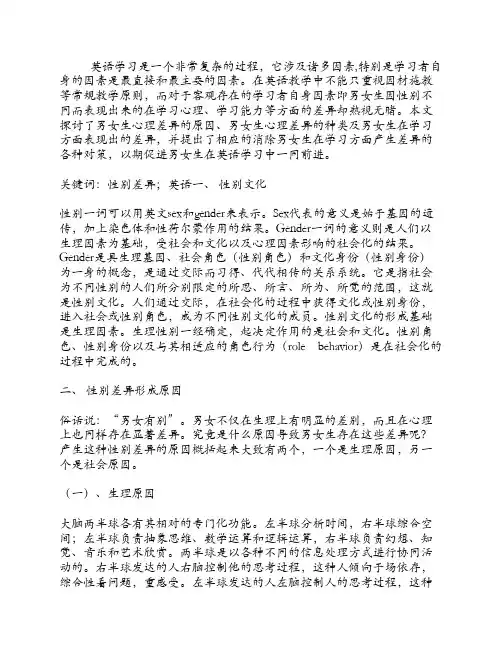
英语学习是一个非常复杂的过程,它涉及诸多因素,特别是学习者自身的因素是最直接和最主要的因素。
在英语教学中不能只重视因材施教等常规教学原则,而对于客观存在的学习者自身因素即男女生因性别不同而表现出来的在学习心理、学习能力等方面的差异却熟视无睹。
本文探讨了男女生心理差异的原因、男女生心理差异的种类及男女生在学习方面表现出的差异,并提出了相应的消除男女生在学习方面产生差异的各种对策,以期促进男女生在英语学习中一同前进。
关键词:性别差异;英语一、 性别文化性别一词可以用英文sex和gender来表示。
Sex代表的意义是始于基因的遗传,加上染色体和性荷尔蒙作用的结果。
Gender一词的意义则是人们以生理因素为基础,受社会和文化以及心理因素影响的社会化的结果。
Gender是具生理基因、社会角色(性别角色)和文化身份(性别身份)为一身的概念,是通过交际而习得、代代相传的关系系统。
它是指社会为不同性别的人们所分别限定的所思、所言、所为、所觉的范围,这就是性别文化。
人们通过交际,在社会化的过程中获得文化或性别身份,进入社会或性别角色,成为不同性别文化的成员。
性别文化的形成基础是生理因素。
生理性别一经确定,起决定作用的是社会和文化。
性别角色、性别身份以及与其相适应的角色行为(role behavior)是在社会化的过程中完成的。
二、 性别差异形成原因俗话说:“男女有别”。
男女不仅在生理上有明显的差别,而且在心理上也同样存在显著差异。
究竟是什么原因导致男女生存在这些差异呢?产生这种性别差异的原因概括起来大致有两个,一个是生理原因,另一个是社会原因。
(一)、生理原因大脑两半球各有其相对的专门化功能。
左半球分析时间,右半球综合空间;左半球负责抽象思维、数学运算和逻辑运算,右半球负责幻想、知觉、音乐和艺术欣赏。
两半球是以各种不同的信息处理方式进行协同活动的。
右半球发达的人右脑控制他的思考过程,这种人倾向于场依存,综合性看问题,重感受。
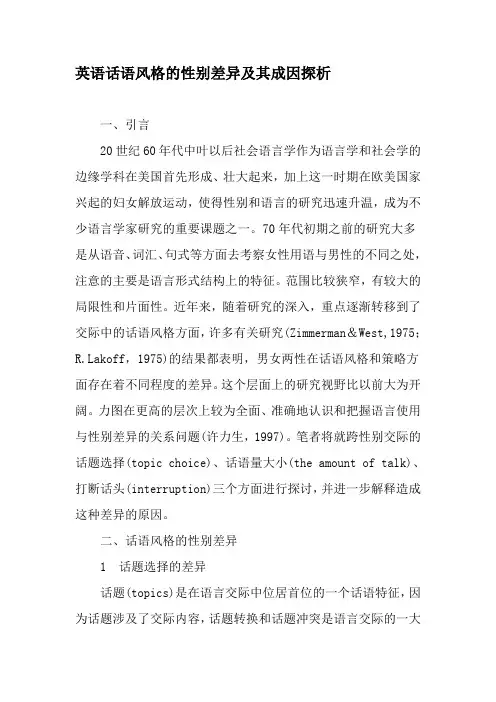
英语话语风格的性别差异及其成因探析一、引言20世纪60年代中叶以后社会语言学作为语言学和社会学的边缘学科在美国首先形成、壮大起来,加上这一时期在欧美国家兴起的妇女解放运动,使得性别和语言的研究迅速升温,成为不少语言学家研究的重要课题之一。
70年代初期之前的研究大多是从语音、词汇、句式等方面去考察女性用语与男性的不同之处,注意的主要是语言形式结构上的特征。
范围比较狭窄,有较大的局限性和片面性。
近年来,随着研究的深入,重点逐渐转移到了交际中的话语风格方面,许多有关研究(Zimmerman&West,1975;koff,1975)的结果都表明,男女两性在话语风格和策略方面存在着不同程度的差异。
这个层面上的研究视野比以前大为开阔。
力图在更高的层次上较为全面、准确地认识和把握语言使用与性别差异的关系问题(许力生,1997)。
笔者将就跨性别交际的话题选择(topic choice)、话语量大小(the amount of talk)、打断话头(interruption)三个方面进行探讨,并进一步解释造成这种差异的原因。
二、话语风格的性别差异1 话题选择的差异话题(topics)是在语言交际中位居首位的一个话语特征,因为话题涉及了交际内容,话题转换和话题冲突是语言交际的一大显著特征。
关于话题的选择,对各种情况的人群进行过调查,所有结果都显示,两性各自经常谈论的话题很不一样。
总的来看,女性较多谈论的话题往往涉及个人、关系当前;而男性喜欢的话题则相反,较少直接坦露自我,与即时情景常保持一定的距离(李经纬。
1998)。
例如:Aries和Johnson(1982)调查的主要是中产阶级,调查发现,女性在朋友(尤其是同性朋友)之间较多地说起个人的情况、坦露自己的情感;而男性则很少这样做,他们谈得较多的是体育、政治、各种竞争以及各自的见闻(Aries,1982)。
Klein(1971)调查的是传统的工人阶级家庭,结果表明,男人们在一起主要谈与工作、体育等有关的事情,几乎从不说起家庭生活与家庭成员;可女人们在一起说得最多的就是家庭,如:孩子、家务、夫妻关系等(Klein,1971:201-320)。
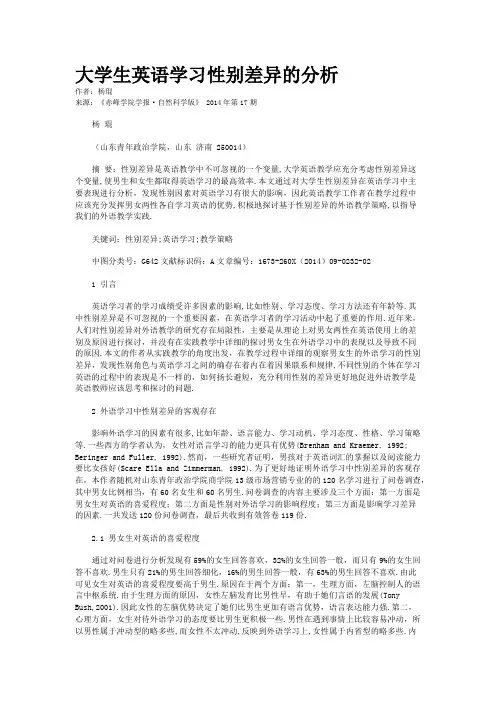
大学生英语学习性别差异的分析作者:杨琨来源:《赤峰学院学报·自然科学版》 2014年第17期杨琨(山东青年政治学院,山东济南 250014)摘要:性别差异是英语教学中不可忽视的一个变量,大学英语教学应充分考虑性别差异这个变量,使男生和女生都取得英语学习的最高效率.本文通过对大学生性别差异在英语学习中主要表现进行分析,发现性别因素对英语学习有很大的影响,因此英语教学工作者在教学过程中应该充分发挥男女两性各自学习英语的优势,积极地探讨基于性别差异的外语教学策略,以指导我们的外语教学实践.关键词:性别差异;英语学习;教学策略中图分类号:G642文献标识码:A文章编号:1673-260X(2014)09-0232-021 引言英语学习者的学习成绩受许多因素的影响,比如性别、学习态度、学习方法还有年龄等.其中性别差异是不可忽视的一个重要因素,在英语学习者的学习活动中起了重要的作用.近年来,人们对性别差异对外语教学的研究存在局限性,主要是从理论上对男女两性在英语使用上的差别及原因进行探讨,并没有在实践教学中详细的探讨男女生在外语学习中的表现以及导致不同的原因.本文的作者从实践教学的角度出发,在教学过程中详细的观察男女生的外语学习的性别差异,发现性别角色与英语学习之间的确存在着内在着因果联系和规律,不同性别的个体在学习英语的过程中的表现是不一样的,如何扬长避短,充分利用性别的差异更好地促进外语教学是英语教师应该思考和探讨的问题.2 外语学习中性别差异的客观存在影响外语学习的因素有很多,比如年龄、语言能力、学习动机、学习态度、性格、学习策略等.一些西方的学者认为,女性对语言学习的能力更具有优势(Brenham and Kraemer, 1992; Beringer and Fuller, 1992).然而,一些研究者证明,男孩对于英语词汇的掌握以及阅读能力要比女孩好(Scare Ella and Zimmerman, 1992).为了更好地证明外语学习中性别差异的客观存在,本作者随机对山东青年政治学院商学院13级市场营销专业的的120名学习进行了问卷调查,其中男女比例相当,有60名女生和60名男生.问卷调查的内容主要涉及三个方面:第一方面是男女生对英语的喜爱程度;第二方面是性别对外语学习的影响程度;第三方面是影响学习差异的因素.一共发送120份问卷调查,最后共收到有效答卷119份.2.1 男女生对英语的喜爱程度通过对问卷进行分析发现有59%的女生回答喜欢,32%的女生回答一般,而只有9%的女生回答不喜欢.男生只有21%的男生回答细化,16%的男生回答一般,有63%的男生回答不喜欢.由此可见女生对英语的喜爱程度要高于男生.原因在于两个方面:第一,生理方面,左脑控制人的语言中枢系统.由于生理方面的原因,女性左脑发育比男性早,有助于她们言语的发展(Tony Bush,2001).因此女性的左脑优势决定了她们比男生更加有语言优势,语言表达能力强.第二,心理方面,女生对待外语学习的态度要比男生更积极一些.男性在遇到事情上比较容易冲动,所以男性属于冲动型的略多些,而女性不太冲动,反映到外语学习上,女性属于内省型的略多些.内省型的要比冲动型的学习态度更加积极一些.学生对英语的喜爱程度是学习的内在动机之一,所以女生对英语学习的主动性要高于男生,学习成绩要好于男生.2.2 性别对外语学习的影响程度有30%的女生认为非常影响,60%的女生认为有些影响,10%的女生认为没有影响.有20%的男生认为非常影响,50%的男生认为有些影响,30%的男生认为没有影响.通过本数据我们可以发现大多数同学认为性别差异对外语学习有影响,只有少数的同学认为性别对外语学习没有影响.2.3 影响学习差异的因素影响学习差异的因素很多,本包括智力因素和非智力因素两个方面,本研究主要选取了以下几个因素对学生进行调查:大脑、兴趣、智力、生理方面,语言学习的环境.研究结果发现其中有90%的女生和95%的男生认为认为语言学习的环境会影响学习差异,60%的女生和50%的男生认为兴趣会影响男女生语言学习的差异,15%的男生和15%的女生认为智力会影响学习差异,30%的女生和50%的男生认为大脑是一个因素.研究结果表明:语言学习的环境和兴趣是影响男女生语言学习差异的主要因素.女生相对于男生来说对语言的学习兴趣要高,而且在语言表达、阅读和识记方面的学习能力优于男生,而且女生对外语学习的环境更加敏感而且喜欢交流、讨论,参加集体学习.因此,在外语教学过程中,教师应该为学生创造更好地语言学习环境,多动脑筋提高学生的学习兴趣,这样才能更加有效的促进英语教学.3 尊重性别差异的教学策略性别差异对大学生学习英语的影响是客观存在的,性别差异会导致学习兴趣、学习信心、学习方式和学习性格的不同,因此教师在教学过程中要尊重性别差异,对其对症下药,因性施教,只有这样才能更好地推动大学英语教学.首先,男生和女生在智力和个性方面是有差别的,教师应该多了解学生,尊重男生和女生的心理差异,从心理差异的角度客观的分析男生和女生各自的特点,区别对待,充分发挥女生的优势条件,例如在词汇教学方面,教师可以多进行猜词,词语接龙的等活动,因为女生的记忆力在动作或形象记忆水平比较高,生动的情形下对词汇或单词的记忆会比较深刻,可以提高她们的英语表达能力,有利于更好地培养女生学习英语的兴趣.在日常教学中,老师应该设计一些小组的活动,选择男生担任该组的组长,这样其实是对男生的一种鼓励,最为组长,他的主要任务是组织小组成员搜集材料,整合材料,汇报材料,通过这用方式以增强其对英语学习的兴趣,增加其自信心,培养英语学习的兴趣.如果有了自信心和学习兴趣,男生的学习成绩可以较快的得到提高.其次,教师可以采取有一些的措施来充分发挥女生学习英语的优势,比如女生的记忆力要强于男生,在教学过程中要多设计一些合理的加强记忆力的活动,强化女生对一些单词和词汇的记忆.同时让女生负责检查男生对单词的记忆,在女生的督促下男生可以更快的记住单词和词汇;女生在阅读方面会弱一些,教师平时在讲解课文的时候要多提问理解的问题,然后进行小组讨论,这样学生们可以互相学习从多个角度的对问题进行深入思考和分析.在日常教学中发现男生在发音、词汇、语法、口语表达等方面的相对比较弱,老师平时要督促他们多练习口语,多多模仿,比如多看英文电影,多听英文歌曲,多举办演讲比赛,比赛结果纳入平时成绩中,这样学生练习的积极性要更高一些.再次,重视男生的心理,采取各种方法培养男生的学习兴趣.教师要考动脑筋经常变化教学内容、教学方法,及课堂的组织形式,一定要是英语课堂生动有趣.根据文秋芳对英语学习的调查研究,英语学习者学习英语的时间每周不低于5个小时,学习才能有显著地效果.因此老师要想办法减轻男生的学习焦虑,例如进行一些难度较低的小测试,多组织一些有意义的活动比方安排一些短句表演让男生多参与进来,通过这些方法可以培养他们的学习兴趣,激发他们的学习动力.平时对男生的要求要低一些,让男生感受到成就感,有信心学习英语.老师要帮助树立有利于英语学习的端正的学习态度,因为积极地学习态度会有利于英语学习的.再次,教师要充分利用男女存在的差异,使男女生相互取长补短,共同进步.心理学的有些研究表明:异性交往具有情感互相安慰、智力相互补偿,个性互补,活动互激等得作用,因此老师应在教学过程中多鼓励和支持男女互补,在教学中,多设计小组合作的活动,将不同性别、性格和口语水平的同学编为一组,鼓励他们共同完成一项任务,比如安排学生做role-play的活动或者给定一个题目,让小组做一个ppt的汇报活动.这样既有利于优势互补,又有助于互动交流,开阔思路.或者举办男女共同参与的的经验交流大会,男女生各发表自己的观点,互相学习,取长补短.最后,老师应该从心里发展的角度客观的分析男女的不同特点,多了解学生,制定不同的教学方法,对其进行因材施教,千万不能千篇一律的教学,使每一个学生都能发挥出自己的优势,同时又能取长补短,更好地提高学习效率.对于学生在英语学习中表现出来的新现象、新趋势,教师都应及时的进行观察,分析和研究,以其在英语的教与学的过程中取得更大的进步.参考文献:〔1〕邓莉.英语性别差异的社会语言学分析[J].高教论坛,2004(05).〔2〕冯群.英语日常交际中体现的性别语言差异[D].上海师范大学,2005.〔3〕冯群.英语日常交际中体现的性别语言差异[D].上海师范大学,2005;田少平.浅议英语教学[J].湖北教育(教学版),2005(04).〔4〕李燕垣.英语中性别差异与英语教学[D].外交学院,2005.〔5〕王初明.应用心理语言学[J].长沙:湖南教育出版社,1990.105-128.〔6〕文秋芳.英语学习策略论[M].上海:上海教育出版社,1996.〔7〕赵蓉晖.语言与性别口语的社会语言学研究[M].上海:上海外语教育出版社,2003.。
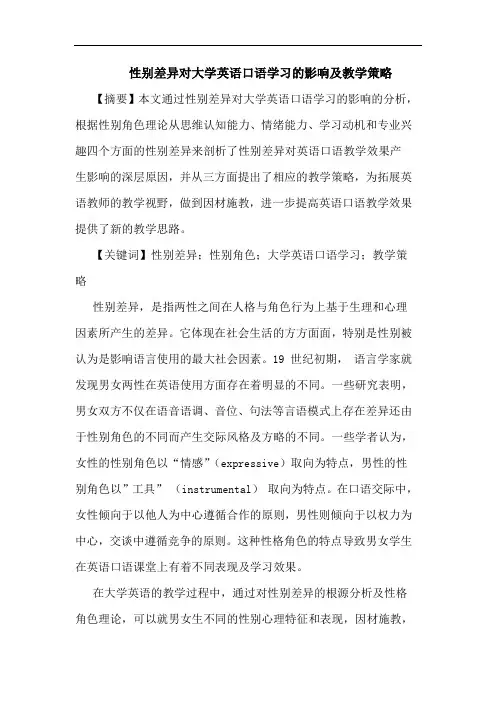
性别差异对大学英语口语学习的影响及教学策略【摘要】本文通过性别差异对大学英语口语学习的影响的分析,根据性别角色理论从思维认知能力、情绪能力、学习动机和专业兴趣四个方面的性别差异来剖析了性别差异对英语口语教学效果产生影响的深层原因,并从三方面提出了相应的教学策略,为拓展英语教师的教学视野,做到因材施教,进一步提高英语口语教学效果提供了新的教学思路。
【关键词】性别差异;性别角色;大学英语口语学习;教学策略性别差异,是指两性之间在人格与角色行为上基于生理和心理因素所产生的差异。
它体现在社会生活的方方面面,特别是性别被认为是影响语言使用的最大社会因素。
19 世纪初期,语言学家就发现男女两性在英语使用方面存在着明显的不同。
一些研究表明,男女双方不仅在语音语调、音位、句法等言语模式上存在差异还由于性别角色的不同而产生交际风格及方略的不同。
一些学者认为,女性的性别角色以“情感”(expressive)取向为特点,男性的性别角色以”工具”(instrumental)取向为特点。
在口语交际中,女性倾向于以他人为中心遵循合作的原则,男性则倾向于以权力为中心,交谈中遵循竞争的原则。
这种性格角色的特点导致男女学生在英语口语课堂上有着不同表现及学习效果。
在大学英语的教学过程中,通过对性别差异的根源分析及性格角色理论,可以就男女生不同的性别心理特征和表现,因材施教,采取有效的针对性的教学策略,从而提高大大教学效率。
1 性别差异对大学英语口语学习的影响从认知能力方面的性别差异研究表明,言语发展的差异从婴儿期到青春前期,女孩言语发展一直优于男孩,在包括接受性和创造性言语任务及需要高水平言语能力的任务中,女孩得分均高于男孩,女性口头言语有更明显的流畅性和情感性,很少有口吃等言语缺陷,男性的言语表达具有较强的逻辑性和哲理性。
在语音方面,女性的音高语速语调等均高于男性。
音调上女性高于男性,女多用升调蕴含怀疑和期待的情感信号,男性多用降调表示肯定。
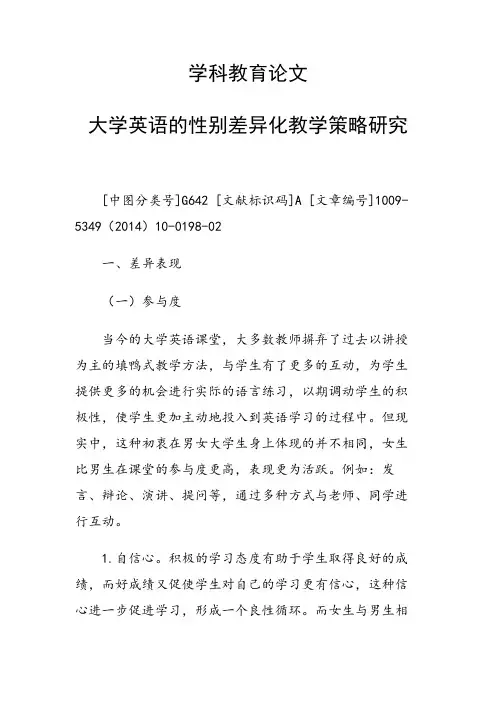
学科教育论文大学英语的性别差异化教学策略研究[中图分类号]G642 [文献标识码]A [文章编号]1009-5349(2014)10-0198-02一、差异表现(一)参与度当今的大学英语课堂,大多数教师摒弃了过去以讲授为主的填鸭式教学方法,与学生有了更多的互动,为学生提供更多的机会进行实际的语言练习,以期调动学生的积极性,使学生更加主动地投入到英语学习的过程中。
但现实中,这种初衷在男女大学生身上体现的并不相同,女生比男生在课堂的参与度更高,表现更为活跃。
例如:发言、辩论、演讲、提问等,通过多种方式与老师、同学进行互动。
1.自信心。
积极的学习态度有助于学生取得良好的成绩,而好成绩又促使学生对自己的学习更有信心,这种信心进一步促进学习,形成一个良性循环。
而女生与男生相比,在英语学习上态度更加认真积极,也更有自信。
社会上普遍存在这样一种认识,即男性擅长数理化等理科领域等,女性擅长语文、英语等文科领域,这些传统的观念一定程度上影响男生学习英语的兴趣和自信。
2.独立性。
任何人在学习的过程中都会遇到问题和困难,而男女学生在面对困难时的解决方式不同。
女生更倾向于向老师、同学寻求帮助,而男生则更多依靠自己的力量解决而选择不求助。
传统观点认为,女生的依赖性更强,男生的独立性更强。
一般情况下,男生为所谓尊严和面子的考虑,并不情愿在别人面前暴露自己的不足之处。
因此,即使在英语学习过程中遇到困难,也通常会尝试自我解决或者隐藏、回避问题。
3.学习成绩。
大量的统计数据[1]以及笔者的实际教学经验表明,大学男生和女生的英语成绩也表现出一定的差异。
无论是每学期的期末考试,还是四六级考试,女生的成绩都要普遍高于男生;一定范围内高分段的女生数量要多于男生;在合格率和通过率方面,女生也要优于男生。
二、产生差异的原因分析(一)智力因素男女在智力总体水平上大致相同,但因智力结构的差异,导致各自具有其优势领域:1.感知觉方面。
男女在感知觉方面有其各自的优势,男性长于视觉能力,尤其是空间感知与想象;而女性的强项在于听觉,擅长辨别和定位声音。
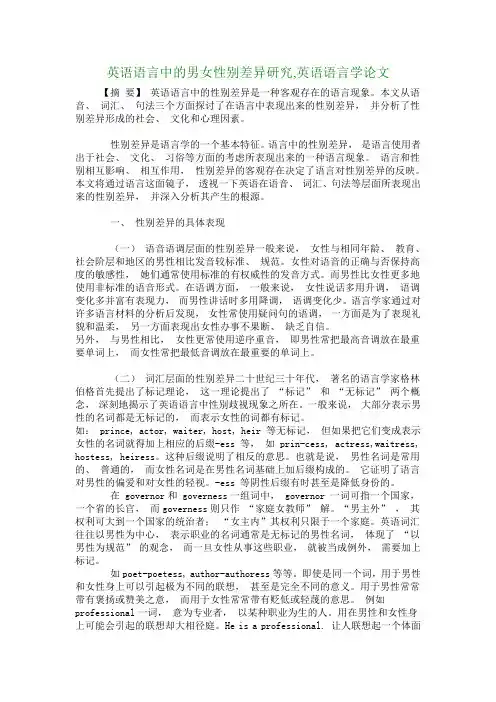
英语语言中的男女性别差异研究,英语语言学论文【摘要】英语语言中的性别差异是一种客观存在的语言现象。
本文从语音、词汇、句法三个方面探讨了在语言中表现出来的性别差异,并分析了性别差异形成的社会、文化和心理因素。
性别差异是语言学的一个基本特征。
语言中的性别差异,是语言使用者出于社会、文化、习俗等方面的考虑所表现出来的一种语言现象。
语言和性别相互影响、相互作用,性别差异的客观存在决定了语言对性别差异的反映。
本文将通过语言这面镜子,透视一下英语在语音、词汇、句法等层面所表现出来的性别差异,并深入分析其产生的根源。
一、性别差异的具体表现(一)语音语调层面的性别差异一般来说,女性与相同年龄、教育、社会阶层和地区的男性相比发音较标准、规范。
女性对语音的正确与否保持高度的敏感性,她们通常使用标准的有权威性的发音方式。
而男性比女性更多地使用非标准的语音形式。
在语调方面,一般来说,女性说话多用升调,语调变化多并富有表现力,而男性讲话时多用降调,语调变化少。
语言学家通过对许多语言材料的分析后发现,女性常使用疑问句的语调,一方面是为了表现礼貌和温柔,另一方面表现出女性办事不果断、缺乏自信。
另外,与男性相比,女性更常使用逆序重音,即男性常把最高音调放在最重要单词上,而女性常把最低音调放在最重要的单词上。
(二)词汇层面的性别差异二十世纪三十年代,著名的语言学家格林伯格首先提出了标记理论,这一理论提出了“标记”和“无标记”两个概念,深刻地揭示了英语语言中性别歧视现象之所在。
一般来说,大部分表示男性的名词都是无标记的,而表示女性的词都有标记。
如: prince, actor, waiter, host, heir 等无标记,但如果把它们变成表示女性的名词就得加上相应的后缀-ess 等,如 prin-cess, actress,waitress, hostess, heiress。
这种后缀说明了相反的意思。
也就是说,男性名词是常用的、普通的,而女性名词是在男性名词基础上加后缀构成的。
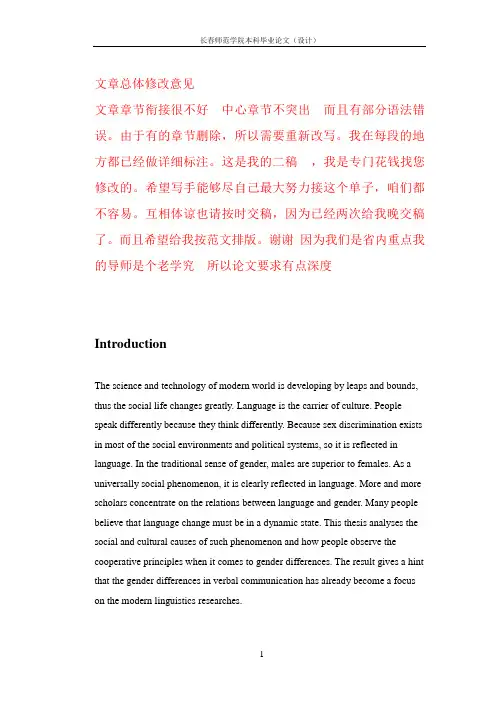
文章总体修改意见文章章节衔接很不好中心章节不突出而且有部分语法错误。
由于有的章节删除,所以需要重新改写。
我在每段的地方都已经做详细标注。
这是我的二稿,我是专门花钱找您修改的。
希望写手能够尽自己最大努力接这个单子,咱们都不容易。
互相体谅也请按时交稿,因为已经两次给我晚交稿了。
而且希望给我按范文排版。
谢谢因为我们是省内重点我的导师是个老学究所以论文要求有点深度IntroductionThe science and technology of modern world is developing by leaps and bounds, thus the social life changes greatly. Language is the carrier of culture. People speak differently because they think differently. Because sex discrimination exists in most of the social environments and political systems, so it is reflected in language. In the traditional sense of gender, males are superior to females. As a universally social phenomenon, it is clearly reflected in language. More and more scholars concentrate on the relations between language and gender. Many people believe that language change must be in a dynamic state. This thesis analyses the social and cultural causes of such phenomenon and how people observe the cooperative principles when it comes to gender differences. The result gives a hint that the gender differences in verbal communication has already become a focus on the modern linguistics researches.I. A Brief Introduction of Gender language Differences.1.1 Definition of Gender Language Differences(老师说这段语法错误很多请仔细检查,她没有一个一个给我指出而且这个也很重要要是看你前面都改得不认真就直接返功了)It is easy to find that gender differences are reflected in language as a basic fact existing in most of the countries and people’s daily life. Man and woman speak differently because they think differently. But what is the element that causes the difference? It may be very difficult to answer the question. A lot of linguists find their interests on it and have their researches. It is said by Lakoff, (老师说不明白什么意思)who published an article named ‘Language and women’s place’. Lakoff的一个观点。
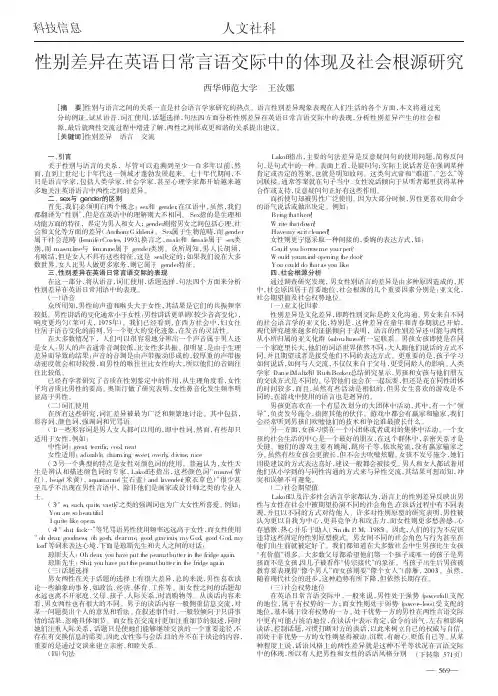
浅析跨文化交际中的性别文化差异作者:刘卫红来源:《校园英语》 2019年第7期【摘要】随着跨文化交际研究的不断深入,学者们开始重视同一主流文化内不同群体文化及其相关交际文化的研究,从而出现了性别(交际)文化(gender communication culture)的概念。
本文从文化视角来分析男女性别间在交际方面存在的差异,旨在解决性别文化差异给跨文化交际所带来的矛盾,并提出有效的交际途径,以促进跨性别间的有效交流。
【关键词】性别文化;男女交际特点;风格;有效途径【作者简介】刘卫红(1994-),女,汉族,贵州贵阳人,贵州民族大学文学院硕士研究生,研究方向:跨文化交际与翻译。
一、文献综述在跨文化交际中,性别因素对跨文化交际有着重要的影响。
如果忽略男性与女性的性别差异,则会导致交际失误,妨碍交际的顺利进行,因此性别因素在跨文化交际中的研究越来越引起人们的关注。
其中,心理学家吉尔特·霍夫斯泰德在他的理论霍夫斯泰德文化维度理论(Hofstede’s cultural dimensions theory)中提到了男性化与女性化(Masculinity versus Femininity),表达了男性与女性在社会中的不同表现行为:男性在社会竞争性、独断性更多,女性则谦虚、关爱他人更多。
此外,Wood, Julia T在Gendered Lives: Communication Gender and Culture中提到了女性交际的七个特征:交流平等、对别人话语支持、移情、保持对话、回应别人、对话风格亲密和对话不确定性。
二、性别文化的概念性别一词可分别由sex和gender来表示,然而sex只表达生理意义,gender才表示性别文化的文化和社会意义。
Sex的意义始于基因的遗传,染色体和性荷尔蒙作用的结果。
Gender的意义则是人们以生理因素为基础,受社会、文化和心理因素影响的社会化的结果。
可以说,性别文化是社会为不同性别的人们所分别限定的所思、所言、所为、所觉的范围,人们在社会化的过程中获得文化或性别身份,进入社会或性别角色,成为不同性别文化的成员。
Gender Differences in Communication: ADeep Dive into the Unique DynamicsCommunication is an integral aspect of human interaction, yet it often reveals subtle and profound differences between genders. The male and female communication styles, though overlapping in many ways, exhibit distinct characteristics that shape the way we understand and express ourselves. This essay aims to explore these differences, delving into the psychology, social norms, and biological factors that influence gender-specific communication patterns.Firstly, let's consider the differences in the frequency and intensity of communication. On average, women tend to communicate more frequently and with greater emotional intensity than men. This is not to say that men are less emotional, but rather that they may express their emotions less frequently and with less verbosity. Women often use language as a tool to connect, share feelings, and build relationships, while men may rely more on nonverbal cues and actions to communicate their thoughts and emotions.Secondly, there are differences in the way men and women approach conflict resolution. Women tend to be more open to dialogue and negotiation, seeking to understand the other party's perspective and find common ground. In contrast, men may be more inclined to assert their views and seek a winner-takes-all outcome. This difference often leads to misunderstandings and conflicts in mixed-gender communication, as men may perceive women's conciliatory approach as weakness, while women may view men's assertiveness as aggression.Furthermore, gender roles and social norms play a significant role in shaping communication styles. Men are often socialized to be strong, confident, and assertive, which may manifest in their communication patterns. Women, on the other hand, are often socialized to be nurturing, empathetic, and diplomatic, reflecting in their tendency to prioritize harmony and understanding over conflict and assertion. However, it's important to note that these roles are not fixed, and individuals can and do transcend them based on personal experiences and beliefs.Biological factors also contribute to the differencesin communication styles. Hormones, particularly oxytocinand testosterone, have been linked to differences in empathy and social behavior between men and women. Oxytocin, known as the "love hormone," is associated with increased empathy and affiliative behavior in women, while testosterone, often linked to aggression and competitiveness, may influence men's communication patterns. In conclusion, gender differences in communication are multifaceted, shaped by a combination of psychological, social, and biological factors. Understanding these differences can help us to communicate more effectively and empathetically with those of different genders, bridgingthe gaps in misunderstanding and conflict. By embracing our unique communication styles and striving to understandthose of others, we can create a more inclusive and harmonious communication environment.**男女交流差异深度剖析**交流是人类互动中不可或缺的一部分,然而,它往往揭示出性别之间微妙的、深刻的差异。
性别差异英语话题作文英文:Gender differences have always been a hot topic of discussion. It is undeniable that men and women aredifferent in many aspects, including physical, emotional, and social characteristics. In terms of physical differences, men tend to have more muscle mass and strength, while women generally have a higher percentage of body fat. This can result in differences in athletic performance and physical abilities.In terms of emotional differences, it is often saidthat women are more emotionally expressive and in touchwith their feelings, while men are often taught to suppress their emotions. This can lead to differences in communication styles and problem-solving approaches. For example, women may be more inclined to talk about their feelings and seek emotional support, while men may be more likely to internalize their emotions and try to solveproblems on their own.Socially, there are also differences in the roles and expectations placed on men and women. Traditionally, men have been expected to be the breadwinners and protectors, while women have been expected to be caregivers and nurturers. Although these traditional gender roles are changing, they still have an impact on societal norms and expectations.In my own experience, I have observed these gender differences in various aspects of life. For example, in my family, I have noticed that my male relatives tend to be more reserved and less likely to express their emotions openly, while my female relatives are more open and expressive. In the workplace, I have seen that men and women often have different communication styles and approaches to problem-solving. These differences can sometimes lead to misunderstandings and conflicts, but they can also bring diversity and different perspectives to the table.Overall, it is important to recognize and appreciatethe differences between men and women, while also working towards gender equality and breaking down stereotypes and expectations based on gender.中文:性别差异一直是一个热门话题。
英汉语性别歧视现象的对比研究一、本文概述性别歧视是一个全球性的社会问题,它在各种语言和文化中都有所体现。
本文旨在对比研究英汉两种语言中的性别歧视现象,以期揭示两种文化对性别问题的不同看法和处理方式。
通过对比英汉语言中的性别歧视现象,我们可以更深入地理解语言、文化和社会性别观念之间的相互关系。
本文首先将对性别歧视的定义和类型进行概述,以便为后续的对比研究提供理论基础。
接着,我们将从词汇、语法、语用和修辞等角度,分析英汉两种语言中的性别歧视现象,探讨它们在不同语言结构中的表现形式。
我们还将考察社会文化因素对性别歧视语言的影响,以及语言如何反映和塑造社会性别观念。
通过对比分析,我们期望能够揭示英汉两种语言在性别歧视问题上的异同,以及这些差异背后的文化和社会因素。
我们也希望本研究能够引起人们对性别歧视问题的关注,促进性别平等和尊重的社会氛围的形成。
本文旨在通过对比英汉两种语言中的性别歧视现象,探讨语言、文化和社会性别观念之间的相互关系,以期为社会性别平等和尊重的推进提供有益的启示和建议。
二、文献综述性别歧视作为一种普遍存在的社会现象,不仅影响着个体的认知和行为,还深刻反映了社会的文化、价值观和历史背景。
近年来,随着跨文化交流的不断加深,英汉两种语言中的性别歧视现象逐渐受到学者们的关注。
通过对现有文献的梳理和分析,可以发现英汉两种语言在性别歧视表达方面既有相似之处,也存在显著差异。
在英语中,性别歧视的表现形式多种多样,包括词汇选择、语法结构和语用习惯等方面。
例如,某些职业或领域的词汇往往与某一性别相关联,从而限制了另一性别在该领域的参与和发展。
英语中还存在一些性别特定的代词、形容词和动词等,这些语言结构也在一定程度上强化了性别歧视的观念。
在语用层面,英语中的一些习惯用语和表达方式也反映了性别歧视的现象,如“man's world”(男人的世界)、“man-made”(人为的)等。
相比之下,汉语中的性别歧视现象则表现出一些独特的特点。
浅析英语中的跨性别交际人们在生活中不管做什么,都会与异性交流,诸如父母、同学朋友、上司下属等。
由于会话过程中话题选择、会话原则和言语方式等方面的不一致,跨性别交际中出现的性别差异随处可见。
这是因为不同的性别有着不同的会话风格,男性和女性按照各自的会话风格来规范自己的交际行为。
标签:交际;跨性别交际;会话风格一、引言男性和女性交际过程中,不同的性别身份拥有各自的性别特征,从而在交际中产生了差异。
由于男性和女性在思考、诠释和评价对方的交际意图的方式上存在差异,所以会话中不可避免地存在交际失误现象。
特定历史条件下,男女两性在交际规则、理解和表达、文化背景等方面的思考、理解、表达不一致,实际会话中就会导致在话题选择、会话原则和言语选择等方面有不愉快的现象出现,从而不能很好地完成交际,达到预期目的。
本文从性别交际文化入手,主要从会话风格上分析两性跨性别交际失误的主要表现及形成原因,在此基础上提出一些建议:承认性别文化差异,彼此加强了解,相互包容,相互尊重,灵活对应等。
二、会话风格差异的主要表现跨性别交际的差异是多种多样的,比如社交、饮食、宗教信仰等,但实际交流中的差异更多时候出现于日常交流会话中。
由于男女两性对同一个话题的思考、理解和阐释不一致,最终导致交际失误现象的发生,从而不能达到预计的交流效果。
跨性别交际失误出现于交流的各个环节,国内外的语言专家对此有一定深入的研究,并取得了一定成果,从而帮助交流者有效避免了交际失误现象的发生。
本文主要从会话风格的差异性入手,分析跨性别交际中由于会话风格不同而产生的差异,主要体现在以下几个方面。
(1)话题选择。
男性和女性会话交流中话题内容的选择和交际目的各有其倾向性。
内容上,男性往往围绕社会生活、政治时事、商业、体育等方面展开,内容直白具体,话题中没有过多修饰;女性偏好谈论家庭、时尚和感情等问题,交际中注重感情培养,语气委婉,使用的修饰成分较多。
目的上,男性把会话当做获得信息的工具,倾向于直入主题,省略具体细节,较少涉及自己感情脆弱的一面,往往表现出强势的一面,常打断他人话题陈述个人观点。
收稿日期:2010-07-20修回日期:2010-08-15基金项目:吉林农业大学科学研究启动基金资助项目作者简介:李茶(1984-),女,黑龙江集贤人,助教,在读博士,主要研究方向为应用语言学;金赫(1983-),女,吉林长春人,助教,硕士,主要研究方向为英语文学。
Colleges and universities are obviously different from stu -dents'previous living environment,not only in teaching and learning aspect,but also in communication atmosphere.Students are suddenly pushed onto a stage where thousands of opportuni -ties to communicate with new people are waiting restlessly.Whether they can seize these chances to establish a healthy and friendly relationship with others,especially people of opposite sex,exerts a great influence on their psychological development,thus their future career and family.Why can some students be good at cross -sex communication while others feel perplexed?Some previous studies have found roots in psychological adapta -tion (Wang Ruixin,2003)and personality (Lv Ying,2008),but the impact of psychological sex roles have never been taken into account.Sex role is a hot research topic in various subjects,includ -ing physiological,psychological,behavioral and sociological fields.This paper involves sex role from psychological dimension,agreeing with the Androgyny Sex Role Theory proposed by Bem (1974).According to the theory,people are classified into four categories:masculinity (M),femininity (F),androgyny (A)and undifferentiated (Au).Among the four types,androgyny is the best result of sex role development (Bem,1974,1975).Previous works on sex role and cross -sex communication mainly conclude that men and women hold different sex roles in this society,which leads to their different attitudes and behaviors in communication (Lakoff,1975),thus misunderstandings and failures (Shen Lan,2006).In these studies,sex role is understoodfrom the behavioral and social viewpoint,rather than psychologi -cal dimension.Sex role stereotypes also contribute to the unsatis -fying communication (He Zhifang,etc.2006).Studies on stereo -types notice the significance of "unexpected"sex roles,but still,androgynous and undifferentiated types attract no attention.This investigation will explore whether college students of different sex role types hold significantly different harassment degree in cross -sex communication.1Methods1.1Participants100freshmen and 100sophomores in Jilin Agricultural U -niversity were selected to participate in this survey.They study in four English classes,but major in various subjects covering Chi -nese traditional medicine,gardening,life sciences,electronics,computer science,resources,humanities,etc.Among these stu -dents,102are female and 98are male.1.2Procedure1.2.1InstrumentsThe instruments applied by the current research comprise two parts:1)Sex Role Inventory for College Students (CSRI)composed by Qian Mingyi (2000),which is one of the most frequently used instruments in China to measure the sex role of college students.2)'Comprehensive diagnosis scale of interpersonal relation -ships'composed by Zheng Richang (1994),in which there are 7大学生跨性别交际困扰度的性别角色差异研究李茶1,2,金赫2(1.东北师范大学外国语学院,吉林长春130024;2.吉林农业大学外国语学院,吉林长春130118)摘要:假设双性化大学生在跨性别交际最为顺利,困扰程度最低。
采用大学生性别角色量表(CSRI )对200名大学生进行性别角色测量,把研究对象分为男性化、女性化、双性化及未分化四个类型,并运用郑日昌的“人际关系综合诊断表”中“与异性交往”部分的问卷对研究对象的困扰程度进行考查。
研究结果证实了假设,并发现未分化学生在跨性别交际中最易受阻,女性化学生比男性化学生更易成功。
关键词:性别角色;跨性别交际;困扰程度;大学生;双性化中图分类号:G645文献标识码:A文章编号:1009-5039(2010)10-0207-02A Report of College Students'Sex Role Differences in Cross -sex Communication Harassment Degree LI Cha 1,2,JIN He 2(1.International Studies University,Northeast Normal University,Changchun 130024,China;2.International Studies University,Jilin Agri -cultural University,Changchun 130118,China)Abstract:The hypothesis is that androgynous students perform best in cross -sex communication with the lowest degree of harassment.CSRI is employed to classify 200Chinese college students into four types:masculine,feminine,androgynous and undifferentiated.One part of 'Comprehensive diagnosis scale of interpersonal relationships'is also used to test the harassment degree of the subjects.The research re -sults confirm the hypothesis and meanwhile conclude that in cross -sex communication,undifferentiated students encounter most difficulties and feminine students do better than the masculine.Key words:sex role;cross -sex communication;harassment degree;college students;androgynyitems to test the degree of harassment in communication with op -posite sex.1.2.2Data Collection and AnalysisSince all the subjects are the author's students,the distribu -tion work is much easier and the interview can be conducted conveniently.The questionnaires were passed out and collected during the 20-minute break,with clear oral explanations and written instructions,contributing to the minimum confusion.All the 200questionnaires were returned back and these questionnaire responses were then put into the computer and crosschecked for accuracy.The software used for data analysis is SPSS.2Results and Discussions2.1The Distribution of College Students'Sex Role'Compare means'in SPSS was applied and 'if statement'was written to exclude those unfaithful subjects,leaving question -naires of 92male students and 94female students for further ter,with the median of the rest subjects'scores on "positive masculine scale'and 'positive feminine scale'as the standard,these 186subjects were classified into four sex role groups.The distribution of sex role is shown through 'Crosstabu -lation'in Table 1.Table 1The distribution of college students'sexroleIn the female subjects,27.7%are masculine;25.5%are feminine;25.5%are androgynous and 21.3%are undifferentiat -ed.Among the male subjects,26.1%are masculine;18.5%are feminine;27.2%are androgynous and 28.2%are undifferentiat -ed.From the overall point of view,masculine and androgynous students take a slightly larger part than feminine and undifferen -tiated subjects.The distribution of college students'sex role is even.2.2College Students'Harassment Degree in Cross -sex Com -municationAmong the 28items in 'Comprehensive diagnosis scale of interpersonal relationships',there are 7items to test the degree of harassment in communication with opposite sex.The total scores of the seven items range from 0(no harassment)to 7(highest ha -rassment degree),and the following table presents the scores got by subjects of different sex role types.Table 2Degree of harassment in cross -sexcommunicationAccording to Table 2,only 14%masculine students know well about how to communicate with opposite sex naturally and successfully,46%of them have some harassment now and then and 40%usually have a high degree of harassment,thinking too highly of or holding a prejudice towards opposite sex.Among all the feminine students,14have low harassment degree,23medium and pared with masculine sub -jects,in general,feminine students are less nervous or confused when communicating with people of the opposite sex.This phe -nomenon can find roots in the correlation between positive mas -culinity/femininity and harassment degree.Based on the investigation,75.5%androgynous subjects have low degree of harassment in communication with opposite sex and the harassment degree of the other 24.5%is medium,which indicates that a majority of androgynous students do not feel bewildered or uncomfortable in cross -sex communication.Exchanging thoughts and ideas with people of the other sex can help them gain a better understanding of various individuals and thus establish a more favorable image.Research results also show that 26undifferentiated students have high harassment degree and only one student's degree is low.It means that many undifferentiated individuals encounter great problems when communicating with people of opposite sex and they are confused by how to keep a relationship in a suitable way.'Correlation Analysis'in SPSS was conducted in order to explore the relationship between 'positive masculinity/femininity'and harassment degree in cross -sex communication.The results are shown in Table 3.Table 3Correlations between 'positive masculinity/femi -ninity'and harassmentdegree**Correlation is significant at the 0.01level (2-tailed).Table 3tells us that there exists a significant negative cor -relation between positive masculinity/femininity and harassment degree.And the negative correlation between harassment degree and femininity is more significant than that between harassment degree and masculinity.That explains why masculine subjects generally have a higher degree of harassment than feminine and androgynous ones.3ConclusionsThe current research draws a conclusion that there exist dif -ferent features in cross -sex communication among college stu -dents of the four sex roles.Androgynous students perform best a -mong all the students,with the lowest harassment degree;undif -ferentiated students encounter most difficulties and feminine stu -dents do better than the masculine.These differences can be explained by the features of the four sex roles and correspond to the analysis results on the corre -lation between harassment degree,communication ability and positive masculinity/femininity.This research investigates the college students'sex role differences in cross -sex communication harassment degree,but there are still munication in this paper does not pay as much attention to non -verbal aspect as verbal one.(下转第212页)(上接第208页)Furthermore,the questionnaires applied in this paper need to be improved to explore further information.More effort on this topic is necessary.References:[1]王瑞新.大学生人际交往及相关因素研究[J].辽宁教育学院学报,2003(3):39-41.[2]吕英.大学生人际交往的人格因素调查与研究[J].牡丹江大学学报,2008(12):123-125,130.[3]Bem L.The measurement of psychological androgyny[J].Jour-nal of Consulting and Clinical Psychology,1974(42):155-162.[4]Bem L,Lewis A.Sex role adaptability:One consequence of psy-chological androgyny[J].Journal of Personality and Social Ps-ychology,1975(31):634-643.[5]Lakoff nguage and Women's Place[M].New York:Hark,Har-per&Row,1975.[6]沈岚.交际中的性别差异与跨性别交际失误[J].成都大学学报:社科版,2006(5):119-120.[7]何志芳,刘建平,杨立峰.大学生性别刻板印象的结构研究[J].萍乡高等专科学校学报,2006(1):83-87.[8]钱铭怡,张光健,罗珊红.大学生性别角色量表(CSRI)的编制[J].心理学报,2000,32(1):99-104.[9]郑日昌.大学生心理诊断[M].济南:山东教育出版社,1994:339-344.Just as Noah's ark saved all the lives inside it from the flood,Mellors'cottage also saves him and his lover as well as the living things that belong to the cottage from the awful environ-ment outside.2.2Mythical prototypes2.2.1Connie and AphroditeIn Greek Myth,Aphrodite is the god of love and beauty.She is the symbol of beauty.Besides this,she is also the symbol of libido.Except her husband,the god of fire,she has a lot of lovers:Ares(the god of combat),Poseidon(the god of sea),and so on.In Lady Chatterley's Lover,the main character,Constance Chatterley just has the same feature as Aphrodite.In this novel, Constance is described as a charming woman:"Being a soft,rud-dy girl,with big blue eyes,and curling,brown hair,and a soft voice,she was considered a little old-fashioned and‘womanly'". (Lawrence,1994,P19)At the beginning of this novel,the readers know that Con-stance has an unhappy marriage.She,in the obedience of her parents,married with an aristocrat,Clifford.Although they were close,they merely had the physical touch.Unfortunately,the war left her husband paralyzed from the waist down.Her experience is similar to Aphrodite,who,also in obedience of her father Zeus, married with a disabled husband.Then,as the story developed,Constance began to have more complaint toward her husband,Clifford.She couldn't get any physical satisfaction from her husband.Driven by her primary instinct,Constance had her first lover,Michaelis.However,just like Aphrodite and her lover taunted by other gods,this personal relationship with Michaelis brought Constance more trouble than satisfaction.She was put to shame by Michaelis incomprehensible brutality and his contempt for women.What's more,she found that her good figure was also changed badly.When those changes made Constance desperate and felt that all great dynamic words were dying from day to day,she met her savior---Mellors.Like the god of love meets the handsome man Adonais,she soon fell in love with Mellors.Mellors perfect figure and true love really brought both physical and mental fulfillment to Constance,which helped her out of desperate and became alive again.2.2.2Clifford and TantalusTantalus,in Greek Myth,is the son of Zeus,and also the ruler of Sipylus of Lydia.The gods of Olympus treat him as their friend and give him many prizes.Although his father is god,he still can't escape from the fact that he is only a common people, and can't enjoy the presents given by gods.In this circumstance, he begins to play tricks on gods.His disrespect towards gods fi-nally irritates those gods and they send him to Hades,where he suffers from the crises of death and starvation although the food and water are just near his body.The poor experience of Tantalus is the vivid description of people's dissatisfaction.Clifford,lady Chatterley's husband,just owns the same fea-ture as Tantalus.He is very rich and has great property---Wragby Hall.He is an aristocrat and become a baronet after his father died.This identification makes him an arrogant person.He dis-likes any suggestion of a really exceptional human being.In his mind,people must be more or less at his level,or below it.As for Constance,he considers her as his wife,a higher being,and con-siders Connie as his property.So when he knows that Connie falls in love with his gamekeeper,he is very angry.Like Tantalus play trick on the gods because he can't take the presents given by them,Clifford refuses to divorce with Connie and expects that through this way he could punish her and prevent her from giving him away.However,his way couldn't save the"love"between him and Connie.Finally,Connie leaves him and finds her own way of life and he never meets Connie again though he is still her husband-in-law.3ConclusionIn western literature world,both Greek Myth and The Bible have great influences.The heroes and gods that exist in Greek Myth are actually the representatives of our human beings,who have desires and pursuits and their personalities are the reflec-tions of human being's personalities.Fully influenced by these two great works,wrence explained the images described in them in his own way and thus gave the readers a chance to see these two classics in a new perspective.References:[1]Anne F.The Cambridge Companion to D H Lawremce[M].Lon-don:Cambridge University Press,2001.[2]Diana T.The Portable D H Lawrence[M].New York:The VikingPress,1997.[3]Lawrence D dy Chatterley's Lover[M].3rd ed.Beijing:For-eign Language Teaching and Research Press,1994.[4]Ye X G.D H Lawrence and The Bible[M].Journal of ForeignLiterature,Vol.2.1995.[5]陈德中,译.希腊神话故事[M].西安:陕西师范大学出版社,2004.[6]李娟.圣经旧约[M].魏玉奇,译.天津:天津人民出版社,1998.[7]刘更祥.劳伦斯的阿芙罗狄特情结[J].长沙电力学院学报,2002(4).[8]郁达夫.读劳伦斯的小说———《查特莱夫人的情人》[M].三味书屋,1934(3).[9]赵晓虹.《查特莱夫人的情人》中的神话原型隐喻[J].固原师专学报,2003(1).。